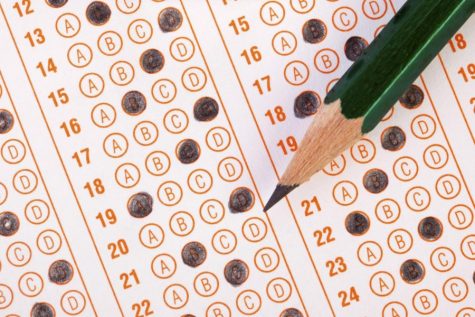SATs and APs: How College Board is monopolizing education

High school is like the Olympics.
It begins with your freshman year when you light the torch of academic stress and start the competition. It is an energy drink and Dunkin’ cappuccino-fueled competition against ourselves, our classwork and our peers. And if academics was not enough for you, you’ll be pleased to know that the competitions include sports, clubs and extracurriculars that will all stand out on a future college application. The gold medal is awarded to those who succeed to be the perfect student, the kid that colleges want. After the acceptances come back and the next step becomes clear, the closing games of high school begin, leading up to our ultimate graduation. But like the Olympics, high school has become commercialized, with the biggest culprit being the College Board.
In my high school career, I have dealt with the College Board plenty. I was there for the PSAT, the online APs, the website crash when scores were released, and the millions of times I heard “Pay attention. This is always on the AP.” Very little did I actually question what was behind it as time was scarce and the why seemed less important than what was in front of me. Nor did I question why I took these classes and why I felt that I would have not been good enough without them. Validation of intelligence (or rather, the ability to memorize) was one hell of a drug so I continued beating my boat against the current for the pursuit of something academically greater than myself.
The Scholarship Aptitude Test, known casually as the SAT, is a test designed to assess one’s general knowledge of math, reading, language comprehension and writing. One test ranges anywhere from $47 to $64, depending on completion of the optional essay assignment, and there is no discount for retaking this test, which is a decision many students choose to make. Generally, scores from either this or the ACT are required in college applications, though it will cost you an additional $12 per school to send it in.
APs, or advanced placement classes, are another service offered by the College Board which attracts students for their “college-level” material, with a $100 test in May to get the college credits. Some schools accept these classes in substitution for their own classes offered, though it is based on the standardized test scores one receives, regardless of a student’s overall performance in the class.
For either the SAT or AP tests, there is very little flexibility provided in testing or in scoring. There is also little flexibility in pricing and minimal attributes can be the deciding factor between who receives a discount and who does not. This allows the College Board the freedom to raise prices and corner students into paying so as to not be put at a disadvantage in the college selection processes. Additionally, David Coleman, chief executive of this “non-profit organization,” receives a yearly salary of $900,000. The board showed a surplus (or profit) of $94.2 million in 2018.
And while a free market is the American way, Teddy Roosevelt had a point: Economic freedom cannot exist with the threat of cap-and-gown-covered monopolies.
But our education isn’t doomed, nor is our insatiable desire to remain distinguished. A strong option to consider is implementing more dual-enrollment courses that are connected through public universities. For example, SUNY schools have accessible programs for Pelham Memorial High School students such as forensic science, science research and language courses. While a payment must be made to take a test for certain courses, the money funds a college that makes education accessible to all and not a money-hungry corporation. Additionally, these are real college credits at reduced tuition, unlike AP courses, which may or may not be accepted by your college of choice—or colleges may not offer credit but only allow the option to opt-out of introductory courses.
As a high school senior, I intend to drop out of the cult-like following of the APs and SATs the moment I receive my diploma. Furthermore, I know that I alone cannot take down the College Board, so instead, I offer my advice to high school students’ future and present. Distinguishment isn’t measured by the classes that you choose to take or scores from 1 to 5. It’s measured by what you do, what you learn and how you use that knowledge to benefit the world around you.
To parents: your child doesn’t need to be enrolled in multiple APs in order to be good enough. Don’t base your standards on what the College Board tells you your child needs to be and instead create your own standards with your child. And please, remind them that they are more than a grade.
Katja Fair participated in the science research program with an interest in neurology and animal science and has completed two independent research projects...








Beth Blanc • Mar 18, 2021 at 4:06 am
Katja, another thought-provoking and interesting article! You peaked my interest at ‘Oympics’ and had me reeled in by ‘Dunkin’. Great job!